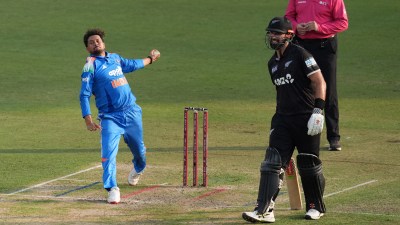Sheikh rattled
Speaking to The Indian Express on the telephone just hours before he flew to Lahore to watch the two final one-dayers between India and Paki...

Speaking to The Indian Express on the telephone just hours before he flew to Lahore to watch the two final one-dayers between India and Pakistan, Abdul Rahman Bukhatir was a mixture of confidence and caution.
Bukhatir, chairman of Taj Television, the company that runs the embattled Ten Sports, said it would be difficult to calculate the precise impact of the Supreme Court order that directed his channel to share with Doordarshan DD its signals for the ongoing cricket series in Pakistan.
8216;8216;When the matter was first brought before the Madras High Court,8217;8217; the UAE8217;s real-estate-cum-cricket-tycoon said, 8216;8216;we thought the court would protect our copyright and intellectual property. But 8230;8217;8217;
Bukhatir felt DD woke up to Pakistan tour simply too late: 8216;8216;We were surprised that it did not negotiate with us at the right time.8217;8217; A 8216;8216;major problem8217;8217;, he said, was the fact that DD8217;s footprint extends to the Middle East and that the telecast of the cricket series on India8217;s state-owned network has completely disrupted Ten8217;s commercial arrangements even outside the sub-continent.
8216;8216;Our partners in the Middle East,8217;8217; Bukhatir said, 8216;8216;are asking us questions.8217;8217; Ten Sports is committed to sharing its signals with ARY Gold, a channel set up, in essence, for Pakistani expatriates across the world. 8216;8216;We have also sold rights for Kuwait and, in fact, much of the Middle East,8217;8217; Bukhatir said, 8216;8216;to the Pehla Group, a distribution company, what you call an MSO in India.8217;8217;
In India itself, Bukhatir alleged, 8216;8216;Cable operators have taken us off because the matches are now available on DD.8217;8217; The double whammy has hit Ten Sports hard. Explaining the economics of sports channels, Bukhatir said, 8216;8216;They are different from general entertainment channels. We have to be complete sports providers, catering to people of various tastes. In 2002, nobody wanted to bring the football World Cup to India. Ten Sports did, but we made no money.8217;8217;
Ten Sports holds the rights for two other ongoing series, West Indies-England and Sri Lanka-Australia. Yet, as Bukhatir frankly admitted, the telecast of these matches was not profitable. The India-Pakistani clash was meant to be his big revenue earner, 8216;8216;subsidising other sports properties8217;8217;.
Is the long-term viability of Ten Sports now in question? Bukhatir laughed off the suggestion, 8216;8216;We have taken the plunge and we are optimistic 8230; We hope the Indian public will support us.8217;8217; He also confirmed Ten Sports would bid for the television rights for cricket in India, 2004-09: 8216;8216;We will bid for all cricket rights.8217;8217;
The Indian rights are currently held by DD 8212; it bought them for 53 million in 1999. This year, they are expected to a fetch at least double, probably more, unless 8212; following the logic of the recent Supreme Court order 8212; they become a DD monopoly. This month is crucial for Bukhatir for more than one reason. At the end of March, the Indian government8217;s three-year ban on the national team playing in 8216;8216;non-regular8217;8217; venues ends.
The ban was imposed after the match-fixing scandal. Its biggest victim was Bukhatir8217;s Cricketers8217; Benefit Fund Series, which has built stadia and organises tournaments in Sharjah and Tangiers Morocco. Subsequently, an international jury led by Clive Lloyd gave CBFS facilities the 8216;8216;all-clear8217;8217;.
Was the ban discussed when Bukhatir met Indian functionaries 8212; including Law Minister Arun Jaitley 8212; in Delhi this past week? 8216;8216;We did not bring up the ban,8217;8217; said Bukhatir, 8216;8216;because we wanted to focus on the issue at hand.8217;8217; Nevertheless, he didn8217;t forget to add, 8216;8216;We are waiting to have India back in Sharjah.8217;8217;
- 01
- 02
- 03
- 04
- 05































